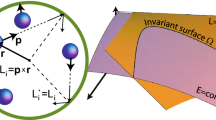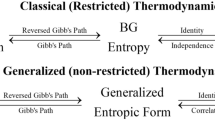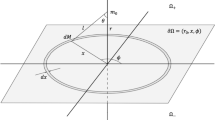Abstract
As is well known, the Born and Green theory of classical fluids1 makes use of the so-called ‘super-position-principle’ first employed, in this connexion, by Kirkwood and Boggs2. Using this hypothesis, a non-linear integral equation is obtained for the radial distribution function, from which other properties of the fluid, such as its pressure, can be calculated.
This is a preview of subscription content, access via your institution
Access options
Subscribe to this journal
Receive 51 print issues and online access
$199.00 per year
only $3.90 per issue
Buy this article
- Purchase on Springer Link
- Instant access to full article PDF
Prices may be subject to local taxes which are calculated during checkout
Similar content being viewed by others
References
Born, M., and Green, H. S., “A General Kinetic Theory of Liquids”, chapters 1 and 2 (Cambridge, 1949).
Kirkwood, J. G., and Boggs, E. M., J. Chem. Phys., 10, 394 (1942).
Mayer, J. E., et al., J. Chem. Phys., 5, 67, 74; 6, 87, 101 (1937).
Rodriguez, A. E., Proc. Roy. Soc., A, 196, 73 (1949).
Fowler, R. H., and Guggenheim, A. E., “Statistical Thermodynamics”, 289 (Cambridge, 1939).
Author information
Authors and Affiliations
Rights and permissions
About this article
Cite this article
RUSHBROOKE, G., SCOINS, H. Born and Green's Theory of Imperfect Gases. Nature 167, 366–367 (1951). https://doi.org/10.1038/167366a0
Issue Date:
DOI: https://doi.org/10.1038/167366a0
Comments
By submitting a comment you agree to abide by our Terms and Community Guidelines. If you find something abusive or that does not comply with our terms or guidelines please flag it as inappropriate.



